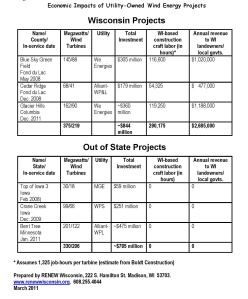Immediate release
July 18, 2011
More information
Michael Vickerman
Executive Director
608.255.4044
mvickerman@renewwisconsin.org
National Study Vindicates Wisconsin’s Clean Energy Policies
Nearly a decade of forward-looking strategies propelled investments in Wisconsin’s clean jobs economy above other Midwest states, according to an economic study issued by The Brookings Institution, a nonpartisan public policy organization in Washington, D.C.
Reviewing data gathered between 2003 and 2010, the Brookings analysis pegged the number of clean economy jobs in the state at 76,858, a net increase of nearly 4,000. Measured as a percentage, Wisconsin’s clean economy accounted for 2.7% of all jobs in the state, compared with 2.5% for Iowa, 2.1% for Minnesota, 1.9 % for both Indiana and Michigan, and 1.8% for Illinois. Overall, Wisconsin ranked 8th among all states and the District of Columbia in the relative size of its clean economy.
The report categorizes clean economy jobs as those in energy efficiency and renewable energy; sustainable forestry products; recycling and reuse; waste management and treatment; organic food and farming; energy efficient appliance and building manufacturing; and more.
“Clearly, Wisconsin’s commitment to clean energy has paid dividends, attracting new businesses and creating high-paying jobs that could have easily gone elsewhere,” said Michael Vickerman, executive director of RENEW Wisconsin, a statewide organization advocating for public policies and private initiatives that advance renewable energy.
These policies and initiatives include the establishment of Focus on Energy, the region’s first ratepayer-funded energy efficiency and renewable energy program, attractive buyback rates offered by utilities for renewable energy, and innovative incentives to encourage customer installation of renewables.
In addition, Wisconsin’s adoption of a 10% renewable energy standard back in 2006 spurred new utility-scale installations built by skilled tradesmen employed by local contractors. During the study period, the number of wind-related jobs in Wisconsin doubled from less than 450 to 900.
As documented in the Brookings report, the wages for these clean economy jobs run higher than the statewide average ($37,931 vs. $35,906).
“Unfortunately, Wisconsin’s clean economy is in danger of losing a good deal of its steam as a result of policy rollbacks and funding cutbacks in the renewable energy arena,” Vickerman said. “The short-sighted attacks we’ve seen in 2011 could throw the state’s clean economy into reverse next year.”
So far this year, the Legislature has reduced funding for Focus on Energy, suspended the statewide rule regulating the permitting of wind turbines, and weakened the state’s renewable energy standard by allowing utilities to count Canadian hydropower toward their requirements.
“On top of that, We Energies, the state’s largest utility, announced that it will discontinue what had been an effective renewable energy initiative,” Vickerman said. “Among other accomplishments, it was instrumental in enabling Helios USA to build a solar-electric manufacturing facility in Milwaukee’s Menomonee River Valley.” The plant now employs 50 workers.
END
RENEW Wisconsin is an independent, nonprofit 501(c)(3) organization that acts as a catalyst to advance a sustainable energy future through public policy and private sector initiatives. More information on RENEW’s Web site at www.renewwisconsin.org.
.jpg)
